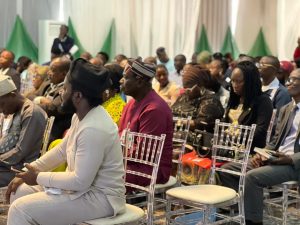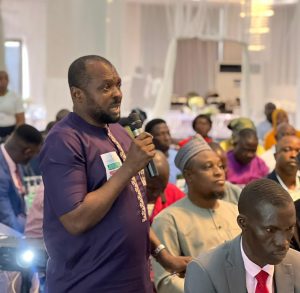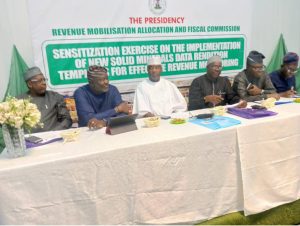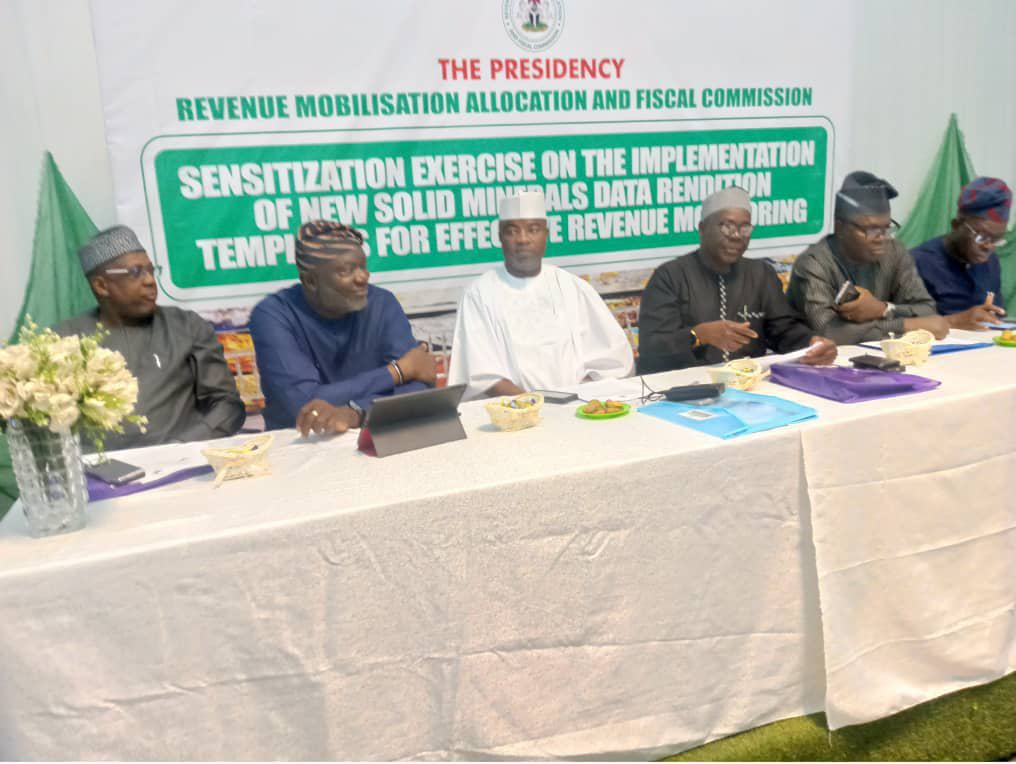Solid Minerals Data Rendition Template’ll Grow Revenue – Makinde
•By Admin
IBADAN – THE Oyo State Governor, ‘Seyi Makinde, has said the implementation of the new solid minerals data rendition template for effective revenue monitoring, will fast-track prompt and accurate remittance of mining revenues to the Federation Account.
According to Makinde, the solid minerals sector remains one of Nigeria’s most promising pathways for economic diversification and revenue expansion.
The governor stated this in his welcome speech at the “Sensitisation Exercise in the South-West Zone on the Implementation of the New Solid Minerals Data Rendition Template For Effective Revenue Monitoring.”
The event held on Wednesday, October 22, 2025, in Ibadan, the Oyo State capital.
“Its implementation will ensure prompt and accurate remittance of mining revenues to the Federation Account; enable real-time tracking of production volumes across mineral types; identify new opportunities for investment and development; strengthen compliance with mining and fiscal regulations; and support evidence-based policy decisions for the sustainable growth of the sector,” the governor said.
The Director-General, Solid Mineral Development Agency, Abiodun Oni, represented both the Oyo State Governor, ‘Seyi Makinde and the
Commissioner for Energy and Mineral Resources, at the event.



The sensitisation exercise, organised by the Revenue Mobilisation Allocation and Fiscal Commission, drew participants from the South-West states comprising Oyo, Ogun, Lagos, Osun, Ekiti and Ondo.
Governor Makinde noted that
although the nation is richly endowed with an array of mineral deposits spread across every region, the wealth remains largely underutilised due to persistent challenges such as inconsistent data reporting, weak monitoring mechanisms, and revenue leakages.
The governor added that the new Solid Mineral Data Rendition Template, would provide a standardised and digital framework for collecting, monitoring, and analysing mineral production and revenue data.
The Chairman, Revenue Mobilisation Allocation and Fiscal Commission, Dr M.B Shehu, in his opening remarks, said the implementation of the new data rendition template was critical to diversifying the nation’s revenue sources.
Shehu was represented at the event by the Chairman, Solid Mineral Monitoring Committee, Hon. Ibrahim B.B Shettima.
He said: “The implementation of the new data rendition templates could not have come at a better time, given the current economic difficulties our country is experiencing at the moment.
“The need to diversify the nation’s revenue sources cannot be overemphasised, primarily because of the perpetual overdependence on hydrocarbon sources of revenue, which is often plagued by the vagaries of the international oil market, in addition to other reasons, which include: shut-ins resulting from pipeline vandalisation and crude oil theft.”
The new data rendition template, according to Shehu, was designed to capture and manage relevant data regarding specific measurement of quantity of minerals produced, producing companies and their locations, particular licences, fees and permits paid by mining companies.
“These data, we believe, if properly managed/utilised, would go a long way in ensuring that mining operations and revenues therefrom, would be more effectively tracked and accounted for,” Shehu said.
He added: “Consequently, the Commission is here in Oyo today, with its partners in the country’s mining sector, to unveil the implementation of the new data rendition template, developing the necessary synergy required to boost mining operations and resultant revenue accruable.”
Team Leader and Federal Commissioner who represented Ogun State, RMAFC, Hon. Akeem A. Amosun, while delivering his address, stressed that the event was necessitated by the need to bridge the observed gaps in the rendition of timely and accurate revenue data on a state-by-state basis, by agencies of government and operators in the solid mineral sector.
He said: “The exercise is also primarily aimed at ensuring the existence of a platform for an independent data source for the Commission, which would be free of summation errors and can be used for comparison and as an advanced information for attribution purposes.”
Nigeria, according to him, still has a long way to go in terms of solid mineral exploration, and also the amount being generated into the Federation Account in comparison with other countries of Africa. He added that the solid mineral sector contributes only 0.7 per cent to the Gross Domestic Product (GDP).
“We know that Nigeria is very endowed. We have a lot of resources. There’s no local government in this country out of the 774 local governments, where you will not find, at least, one solid mineral. And so the question is, why do we have such a marginal percentage to our GDP? That means we have a lot to do in that area, and that’s what we are trying to do,” Amosun said.
Also, the Lead Resource Person and the Managing Director of Architype Industries and former Director, Ministry of Mines and Steel Development, Engr. Adeniran Ajibade, presented a paper on “General Overview of the Global/Nigerian Mining Sector: Assessment of Revenue Contribution Using Data Rendition.”
Delivering the paper, Adeniran underscored the fact that Nigeria is not a mining country, as according to him, the sector is dominated by quarry operators for cement production and civil engineering constructions. He stressed, however, that quarrying is not mining in real industry sense.
Additionally, Adeniran identified poor mining sector governance, despite clear provision in Mining Law (MMA -2007) and Regulations (MMR -2011, leading to widespread (irresponsible), dangerous artisanal mining with severe environmental degradation as factors contributing to underperformance and underdevelopment of the mining sector.
Also, he mentioned conflicts between national and sub-national governments constraining access to land for mining development, as well as threat to security of tenure of mining rights as contributory factors.
The Lead Resource Person further pointed out multiple taxation and illegal mining (both local and foreign operators), and security threats from ungoverned or poorly governed (mining) space, as among the factors.
He also highlighted consequences of poor data record and reconciliation to include: “Discrepancy between the Nigeria Customs Service (NCS) and the Ministry of Solid Minerals Development (MSMD); some companies exploring minerals without obtaining the necessary permits from the Mining Regulator (the Ministry), and not paying the applicable royalties as factors.
Adeniran also revealed severe lack of accountability, transparency and synergy between government agencies, leading to potential revenue losses for the government and overall economic development as additional factors.
Conclusively, the Lead Resource Person suggests training, retraining and increasing the existing staff of the Ministry and its agencies for more effective sector regulatory management and control, among others, as way forward.
Present at the event,
were the National President, Miners Association (MAN), Dele Ayanleke; representatives of the Federal Ministry of Solid Minerals Development, stakeholders from the solid mineral sector, members of the Miners Association of Nigeria, among other stakeholders.
Other resource persons at the occasion, were the Federal Commissioner representing Lagos State, Prof. Olusegun A. Wright; Ganiyu Wasiu Ajibade; Mr Ademola Adebiyi and Neyu Mafuyai.
END

